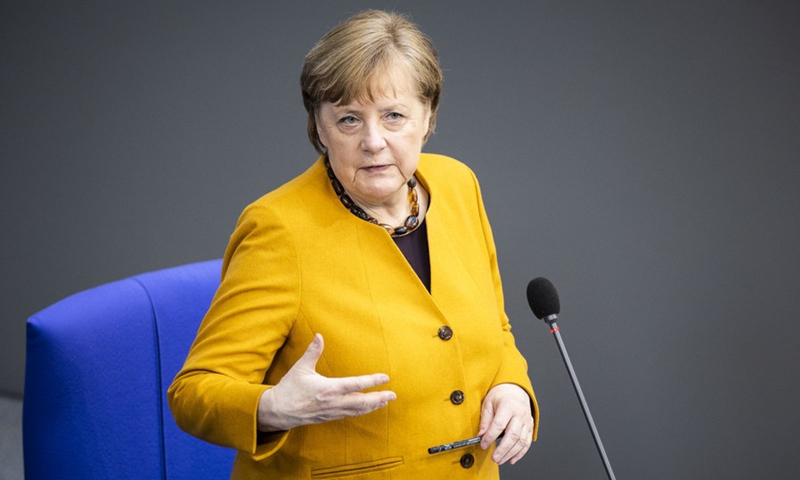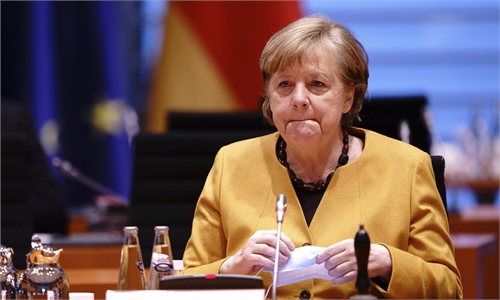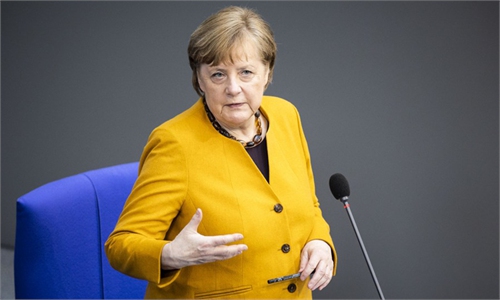
German Chancellor Angela Merkel attends a question session of the German Bundestag in Berlin, capital of Germany, on March 24, 2021. (Florian Gaertner/photothek/Handout via Xinhua)
At the invitation of US President Joe Biden, German Chancellor Angela Merkel is set to visit the US and hold talks with Biden at the White House on Thursday. Biden and US Secretary of State Antony Blinken successively travelled to Europe not long ago. The series of interactions indicate that Washington is racking its brains to establish a united front with Europe and other "like-minded democracies" to formulate "global rules" and deal with China.
Since the UK left the EU with Brexit, Germany has become the main target within the block that Washington wants to woo. By inviting Merkel to visit the US, Washington is seeking courtship with Berlin. The US' main purpose is to draw Germany to its side so that it can unite Europe to maintain order and cope with what it calls the "China challenge" as it wishes.
But there is little chance that Merkel's visit will yield results that meet Washington's expectations.
The key question is: to what extent is the US willing to make compromises over conflicting points between the US and Germany? If the US really wants to show goodwill to Germany and other European countries, it should offer more.
At present, Europe is feeling that the recent visits by Biden and Blinken are only about the US own interests. Many Europeans think that the US is hesitant to take their interests into consideration.
One of the major disputes between the US and Germany regards the Nord Stream 2 project. Although the US announced to waive sanctions against certain major parties involved in the construction of the Nord Stream 2 gas pipeline from Russia to Germany in May, it still maintains a tough attitude. White House spokesperson Jen Psaki recently said that Biden continued to view the pipeline as a "bad deal."
Washington's announcement to lift sanctions came before Biden's Europe tour. It had serious intentions to woo both Germany and Russia. But the subsequent strong remarks concerning the project show that Washington takes the Nord Stream 2 issue as a sword hanging over Germany. It's a bargaining chip against Germany that the US could use at any moment it needs it. This is a headache for Germans.
Clearly, the US wants to rally its European allies against China. Since Biden took office, he has sought to seek courtship with Europe. Some Europeans have more or less tilted toward the US. For instance, several summits that Biden attended during his Europe tour issued tough statements regarding China. But they were not that harsh as Washington expected. Judging from remarks made by Macron and Merkel around the summits, there were differences between Europe and the US. Therefore, the EU will not be fully tied to the US' anti-China chariot.
In terms of Merkel's visit to the US, the German Chancellor has adopted a relatively pragmatic policy toward China during her 16 year tenure. She will not wreck her political legacy as her term comes to an end. Merkel is an experienced politician. She will stick to her current China policy, emphasizing both cooperation and competition with China.
It is fair to say that German and Europe's trust in the US is declining. This can hardly be fixed by Biden showing gestures of goodwill toward the region. Some Germans do think Biden assuming office offers a good chance for Germany and Europe, and they should be more proactive to cooperate with the US. Some, however, are worried. What if Trumpism comes back four years later? If Germany has already tied itself to the US chariot, what if it cannot get off by then? In this light, Germany holds reservations about the US.
After Merkel steps down, Armin Laschet, the leader of the Christian Democratic Union, will most likely become the next German chancellor. He will, to a large extent, continue Merkel's China policy. Laschet has described China as, "a competitor, a cooperation partner, but also a systemic rival." Compared with the past, the competitive side of both China-Germany and China-EU ties will continue to emerge. But even after the new leader assumes office, he will not deny that there are still needs to cooperate with China on many issues.
Germany and Europe will not be completely drawn to the US side. Europe has its own interests, which are different from that of the US. Washington wants to maintain its hegemony and cannot allow China to surpass it. But Europeans do not have the strength or consciousness to become a hegemonic force. They know that pragmatic interests lie in cooperation with China. The alliance between Europe and the US has been restored. But this relationship is only one of self interests. Europe is willing to move closer to the US when there are common interests. Otherwise, the former won't give up its collaboration with China.
The author is director of the German Studies Center at Tongji University. opinion@globaltimes.com.cn



